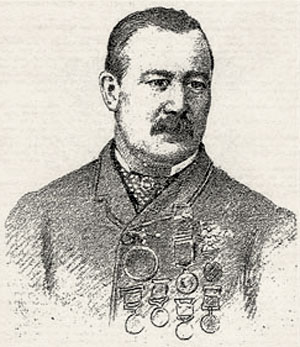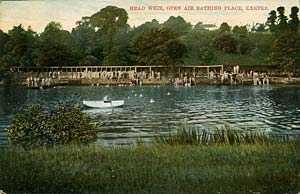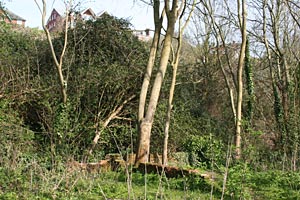
Frank Shooter - Hero of the Exe
Page updated 29 December 2008
Return to Exeter People Menu
In Exwick Cemetery, near the entrance by Exwick Road, can be found the grave of a man who arguably saved hundreds from drowning, and taught thousands of locals to swim. He was a man who served his city with pride, and who was awarded with medals and a generous collection of money for his bravery.
Frank Shooter was born in the third quarter of 1847 in Exeter; his father was Edwin Shooter a master carver from St David's, while his mother Sarah was from St Sidwell's. The 1851 census shows the four year old Frank living with his family at 44 South Street, the youngest of five boys and two girls. By 1861 his mother was listed as the head of the household and the innkeeper at the Masons Arms, 58 West Street. Frank Shooter does not appear in another census until 1891 when he is listed at 31 Edmund Street with his wife Mary Anne and five children ranging from Frank, 20 years old down to three year old Arthur John.
It was in 1872 that Shooter first came to the notice of the Flying Post when they reported him saving the life of Mr H Brockington of Whimple. Three days later he saved the life of Colin Williams, a young man of Longbrook Street and an apprentice coach builder of Mr Sellers. The paper wrote "Frank Shooter, the keeper of the Exeter Bathing Ground, seems to be particularly well-qualified for the post. He has been the cause of saving many persons from a watery grave" a comment that implies his growing reputation in the city. Shooter was appointed bathing superintendent in 1871 after the previous incumbent was sacked for misconduct. The Head Weir Bathing Place was formerly opened by the city council in 1864, on "Mr Carew's old withey bed" - (withey bed–where willow was grown for coppicing).
The first swimming match held at the bathing ground was in September 1872, as Victorian Britain started to swim for both health and safety. The council thanked Shooter for his assistance in the event and, from 1873, the swimming match was an annual occasion held every August.
Life saving medals
The first honour to Frank Shooter by the Royal Humane Society was in 1873, when a Bronze Medal for saving F Prothero from the river at Head Weir was awarded. The next year, a Bronze Clasp was added after he dived into the River Exe fully clothed to save a lad named E H Gibson.
Thirty shillings, two silver and one bronze medals and an ink stand were stolen from a box in a cupboard at the bathing ground, belonging to Frank Shooter by Samuel Harris, George James and Thomas Tozer in 1875, all of whom were given three months prison sentences, some with hard labour. Up until 1875, the post of superintendent was seasonal, but in that year, the council decided to employ Shooter throughout the year - he would be paid 24s per week, for seven months through the summer, and 12s per week for the remainder of the year. Despite some councillors objecting to paying Shooter through the winter, the motion was carried. A further report in May 1875 by the council noted that there was, on average, one drowning a month in the river.
The Royal Humane Society presented Frank Shooter with a bronze medal in October 1877, and his reputation spread. He supervised a swimming match in Plymouth during 1876, when he had to dive into the sea, from the committee boat, to save a man who had fainted in the water - he was awarded with a guinea. He was at Dawlish, in 1878 and 1879, to demonstrate the best method of retrieving to the shore a person in danger of drowning. The annual swimming matches were becoming increasingly popular by 1880, and guest swimmers were invited. In that year, seventeen year old Miss Beckwith, champion lady swimmer, attended to demonstrate her swimming abilities; her fame had spread after she had swum 20 miles in less than 6½ hours. In addition, Shooter organised a series of handicap races, in June and July, for his swimming pupils.
Frank Shooter often competed as a professional swimmer at events around the south-west, and his own children were draughted into activities at the bathing ground. At one display, his young son dived in and saved his little sister, encouraged by an enthusiastic crowd of spectators. In 1880, one son won six races at the annual swimming match. Such events could attract hundreds, if not thousands of spectators, as healthy leisure activities for the working man were promoted. From 1881, his wife was paid 7s 6d per week for duties related to an extension of hours for ladies' use of the bathing ground. And as time went on, and bathing became more popular, Shooter was called upon to organise and supervise other events, such as the Heles's School swimming matches. Almost single handed, within the space of ten years, he had turned Exeter's citizens into swimming enthusiasts. He was a real showman and he once allegedly dived in to the Exe, and emerged from the water smoking a cigar, a trick that added to his popularity. The Victorians loved a showman, and the exploits of Captain Webb, the first man to swim the Channel in 1873 were well known, popularising swimming as a leisure activity.
The Council rewards Shooter
In 1883, he saved a young man named Stanlake from drowning, the third that season, and in the November the Mayor and Sheriff praised him for having saved upwards of three hundred lives since he became bathing superintendent 12 years before. Then twice in 1884, he put himself in danger saving others from drowning (see sidepanel).
The Shooter Testimonial Committee was formed in 1884 to lobby the Royal Humane Society to award him a gold medal for saving life. In the August, the City Council responded by drafting a memorial to be sent to the Society, recommending Shooter for the award. His wages were also increased to 30s per week in season and to 15s out of season. The Flying Post wrote in the same year "... there is left an overwealming amount of skill, promptitude, pluck, and endurance, sufficient to stock half-a-dozen ordinary men with a reputation for heroism."
In January 1885 Frank Shooter was guest of honour of the Council and Mayor William Brown at the Guildhall, when he was awarded the gold medal and a purse containing £135 ".. in testimony of the public appreciation of his numerous acts of gallantry..." There was much cheering and applause between the lengthy Victorian speeches of praise. However, it is possible that a single letter in the same year, with £5 enclosed, from William Edwards from Auckland, New Zealand gave Frank Shooter more pleasure. Ten years before, Edwards and his brother were saved from drowning by Exeter's bathing superintendant.
Keeping fit
Frank Shooter, was a keen pugilist–he opened a gymnasium in Bampfylde Street in October 1889, where instruction in using boxing gloves, fencing, dumb bells, and Indian clubs were given. Another editorial in the Flying Post remarked that Shooter was "...a teacher who never loses his temper–which is a great deal–to help the learner." In a later issue, a report on the annual swimming match introduced two of his pupils aged five and six years who were believed to be the youngest swimmers in England. The two boys swam in their clothes and were enthusiastically applauded.
The Shooter's briefly lived in Stepcote Hill, but in 1892, Frank became landlord of the Fireman's Arms at the corner of West and Preston Street. However, tragedy struck the Shooter family when 12 year old Bert died at the Fireman's Arms the next year.
His eldest son, also Frank, was listed as a plumbers apprentice in early 1891, but he had taken on the Morning Star public house by the August of the same year. Frank Junior had his father's bravado, but none of his common sense, for in March 1892 he entered a cage of lions at Bostock's Menagerie at St James' Field for a wager, with the intention of presenting the winnings to the Mayor's fund. When the Mayor was told of the deed, he censured the hapless Shooter Junior, for recklessness, and he declined the guinea. Frank Junior was, like his father, an enthusiastic pugilist, and he fought for a prize of £10 against T Scoble of Plymouth, at Brockington Mews, Bartholomew Street; the fight was stopped in the tenth and Frank Shooter declared the winner. On another occasion, a rumour seems to have spread that Frank Junior was to fight his father in the ring, an event that was vehemently denied by Frank Senior in a letter to the Flying Post. Harry Shooter, Frank's second son became a hairdresser.
Shooter was superintendent at the bathing ground until 1908, although he had moved to 52 Church Road, St Thomas and was listed as a post and job master in 1906. By 1916, he lived in Diamond Road, St Thomas, while Frank Junior had moved into his house in Church Road.
Frank Shooter died on 21 July 1917, and was buried in Exwick cemetery in a plot which looks across to his old bathing ground on the River Exe. The Flying Post wrote "Amidst manifestations of deep sympathy and regret the remains of Mr Frank Shooter, for 37 years superintendent of Head Wear Bathing Ground, Exeter, were laid to rest in a walled grave at Exwick Cemetery yesterday afternoon, within sight of the place he loved so well, and where the best part of his life was spent."
Source: a short essay by Bill Fevyer, Besley and the Flying Post.
 Frank Shooter with
his medals.
Frank Shooter with
his medals.  Head
Weir bathing ground.
Head
Weir bathing ground.  The
brick walls in the undergrowth are all that remains of the bathing
ground.
The
brick walls in the undergrowth are all that remains of the bathing
ground.
Royal Humane Society Awards
1873 - Bronze Medal
On the 5th
June 1873, at Head Weir, Frank Shooter, dived into the river, and saved
F Prothero from drowning.
1874 -
Bronze Clasp
On the 7th August 1874, Frank Shooter, dived
into the River Exe fully clothed to save a lad named E H Gibson, and
brought him to the river bank.
1877
- Bronze Clasp
Saved Private W Knott on the 31st July
1877, who was drowning in 15 feet of water.
1883 - Bronze Clasp
Saved
H.Stanlake from drowning at Exeter, on the 4th June 1883.
1884 - Bronze Clasp
On the 7th
July 1884, Frank Nicks was saved from drowning at Exeter
1884 - Silver Medal
On 16th
July, 1884, Mr F K Hartnol was canoeing on the mill-stream, when he
tipped over and he was carried into the covered leat. The fully clothed
Frank Shooter entered the 180 yard long tunnel, found Hartnol clinging
to a rock, took him on his shoulders and carried him down the leat to
emerge into daylight, close to Head Weir Mill, below the Engine Bridge.
1885 - Gold Medal
Council Awards
1885 - A purse worth £135
Presented to him with his Gold Medal.
│ Top of Page │